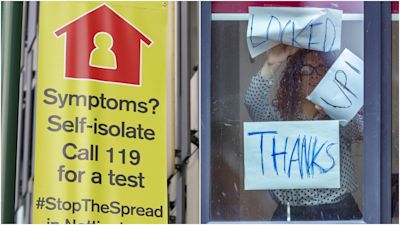'We could do so much better': Expert attacks Covid containment strategy as just '18% complete self-isolation'

Just 18% of people with coronavirus symptoms in the UK are completing the full 10-day self-isolation period, an adviser to the government has suggested.
Professor Susan Michie, who sits on the Scientific Pandemic Insights Group on Behaviours, attacked the UK's test, trace and isolate strategy as she called for self-isolation payments - as reportedly being considered by ministers - saying "many countries" have systems that are "so much better" than Britain's.
For example, free or highly subsidised local accommodation, transport, internet connection and pet care is made available in New York to those who cannot stay in their own homes because they risk spreading the virus to others in their household.
“Many countries are approaching this whole test, trace and isolate system so much better than us," she told the BBC.
“It’s an absolutely key part of the jigsaw of getting out of the pandemic, because we can’t rely on vaccine.
“We need vaccine plus a really good test, trace and isolate system, plus people keeping up with the behaviours, the restrictions, adhering to the guidance.”
She suggested a self-isolation payment would help improve quarantine compliance but the £500 figure being touted would not be enough for some families.
“There will be people, for example single earners in a household looking after a family where £500 over 10 days, £50 a day, is not enough to pay the rent, to pay all the bills and put food on the table," she said.
“If you have 82% of people with symptoms wandering around the community it is very, very difficult to bring this level down.”
Environment Secretary George Eustice told ITV News a £500 self-isolation grant is an option being considered by ministers to incentivise compliance, but no decision had been made.
He said: "At the moment we're obviously in a full lockdown which is the toughest measure you can, so payments of that sort would be unnecessary since the vast majority of people are staying at home.
"We do need to think about what happens as we chart a course out of the lockdown, when we will be relying much more on the test and trace system, and people isolating, we do need people to do that, to isolate when asked, and so we'll be considering options but absolutely no decision has been taken."
He said tougher lockdown restrictions are not being considered, but stricter enforcement of the rules is.
Ms Michie, professor of health psychology at University College London, also attacked the £10,000 fines that police can give out to people breaking self-isolation, saying "we know [it] is now deterring lower-income people from coming forward to be tested".
“In Liverpool, when they did the mass testing evaluation, the most deprived communities were 20 times as likely to be infectious but 20 times less likely to get tested and in the most deprived areas it is only 4% of people coming forward to be tested.
“This is a massive problem that urgently needs to be addressed.”
In a scathing review of test and trace, she said people are hesitant to share their contacts for test and trace due to a “lack of trust” in the system.
“Only 76% of people intend to share their contacts because I think there is a lack of trust in the system.
“It is done by remote call centres rather than by local trusted public health infrastructure that people are familiar with and that is a big problem in itself."
Professor Stephen Reicher, who is advising the Government’s coronavirus response, said universal payments to self-isolate must form an “essential element of our pandemic response”.
The Scientific Pandemic Insights Group on Behaviours (Spi-B) adviser told BBC News: “You can’t have a bureaucratic system, you can’t have a system where people don’t know whether they will get the support or not, it has to be immediate.
New £800 fines for people caught at house parties, Priti Patel announces
PM: 'Too early to say' whether restrictions lifted by spring or summer
“The way to do that is to make it universal.
“Right now, in the middle of the emergency that we find ourselves in, in the middle of the situation where the NHS is close to being overwhelmed, where we need to stop the infection spreading by every means possible, then I think a comprehensive package of care, which includes making it easy for people to access money, but goes beyond that to have a comprehensive package of care, is an absolutely essential element of our pandemic response.
“It’s the big hole that we have to fill if we want to succeed.”
Professor Michie welcomed reports that a self-isolation grant is being considered, saying "at least the Government is recognising this is a key weakness in the whole pandemic strategy".
Listen to the ITV News Politics Podcast: